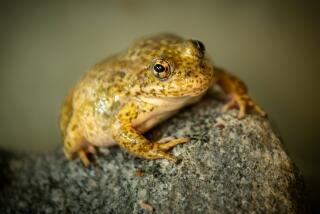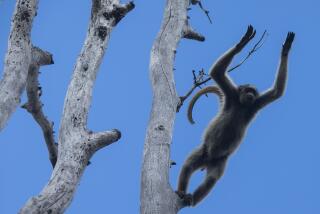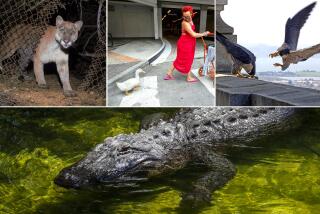Kiss of commercialism turns frog into a prince : The coqui’s call is the sound of Puerto Rico. Images adorn souvenirs, and a tape of the ‘co-kee’ is sold to the homesick.
- Share via
SAN JUAN, Puerto Rico — They are tiny, indigenous to this tropical island, and they are everywhere. Although partial to the lush green mountains and shady rain forest, they thrive in the drier savannah and in potted palms amid the lobbies of beachfront hotels as well.
Their clear, melodic call is the soundtrack of Puerto Rican nights, as familiar as the ocean breeze. Co-kee, they chirp. Co-kee, co-kee.
Yet few of Puerto Rico’s 3.6 million residents and even fewer tourists ever see what is clearly this island’s favorite amphibian and unofficial mascot, the coqui frog. What they do see--in tacky abundance--are largely inaccurate representations of the coqui on T-shirts, ashtrays, key chains, as earrings, stuffed toys, lapel pins and ceramic knickknacks.
“And we’ve sold a few of these too, “ says Charo Lozada, pointing to a shelf in Old San Juan’s Taino Souvenirs, where a plastic band of smiling, bright green coquis pose holding guitars, congas and horns. Price: $7.95.
Now, thanks to a rash of research on the coqui, as well as a cassette tape of the frog’s song being marketed as an antidote to homesickness among Puerto Ricans living off the island, the mysterious Eleutherodactylus coqui is being kissed by a princely image make-over.
“There have been 85 scientific papers written on the coqui in the last 15 years,” says biologist Juan A. Rivero, a professor at the University of Puerto Rico in Mayaguez. “It is easy to study because it is everywhere. It is friendly. And nothing is more typically Puerto Rican.”
Ironically, Rivero agrees that he may have launched the age of coqui commercialization with publication in 1979 of his definitive guide to island reptiles and amphibians. Before that, the coqui was more a creature of myth and folklore than of gift shops and tourism.
According to legend, the coqui will not sing, or survive, away from Puerto Rico. “People like to say they sing because Puerto Rico is such a fine place to live,” says Rivero, who also has published a book on island folklore.
Alas, the real story is that the call of the coqui, like that of most animals, is used both to attract mates and warn off rivals, says Rivero. And despite Puerto Rico’s splendors, the frog will live elsewhere; they are a well-established exotic in South Florida, and they also live in laboratory colonies at the State University of New York at Albany, where ecologist Margaret M. Stewart recently described how the frogs climb to the top of trees at dusk to forage, and then, with bellies full, “parachute” to the ground before dawn.
Describing the frog’s free-fall technique, Stewart wrote that the animal “extended its arms and legs, bent at the knee and elbow joints, and spread its fingers and toes. The frogs rotated slowly as they descended.”
Coqui populations are subject to fluctuations in rainfall, and individuals are preyed upon by spiders, snakes and the pearly-eyed thrasher. But Stewart, Rivero and other researchers have found that coquis are not endangered.
“They are charming, beautiful animals,” says Stewart of the beige frogs, which range from fingernail size to 3 1/2 inches. “They are adaptable and incredible in all the things they can do. And there is nothing like going to sleep to the sound of their lovely call.”
Indeed, it is that call that led biologist Jose Colon to spend many nights sleeping in his car in El Yunque rain forest. There he dodged parachuting coquis to record the critter’s varied call, and with colleagues Myriam Fuentes and William Nemcik, edited his work into a New Age-style tape being sold through Puerto Rican bookstores.
“People here are imprinted on that sound,” says Colon. “It’s soothing, hypnotic, the ambient sound of the island.”
“I think it sounds better than a whale, and people listen to its call,” adds Fuentes. “This tape is like putting a rain forest in your living room.”
Rivero can attest to that. Last summer, he said, he found himself aboard a research ship in the middle of the South Pacific, about as far from Puerto Rico as he could be. When he had trouble sleeping, he recalled, he simply played a coqui tape.
“Some people say they can’t stand it,” said Rivero. “But when you get used to that sound, you miss it when it’s not there.”
More to Read
Sign up for The Wild
We’ll help you find the best places to hike, bike and run, as well as the perfect silent spots for meditation and yoga.
You may occasionally receive promotional content from the Los Angeles Times.






